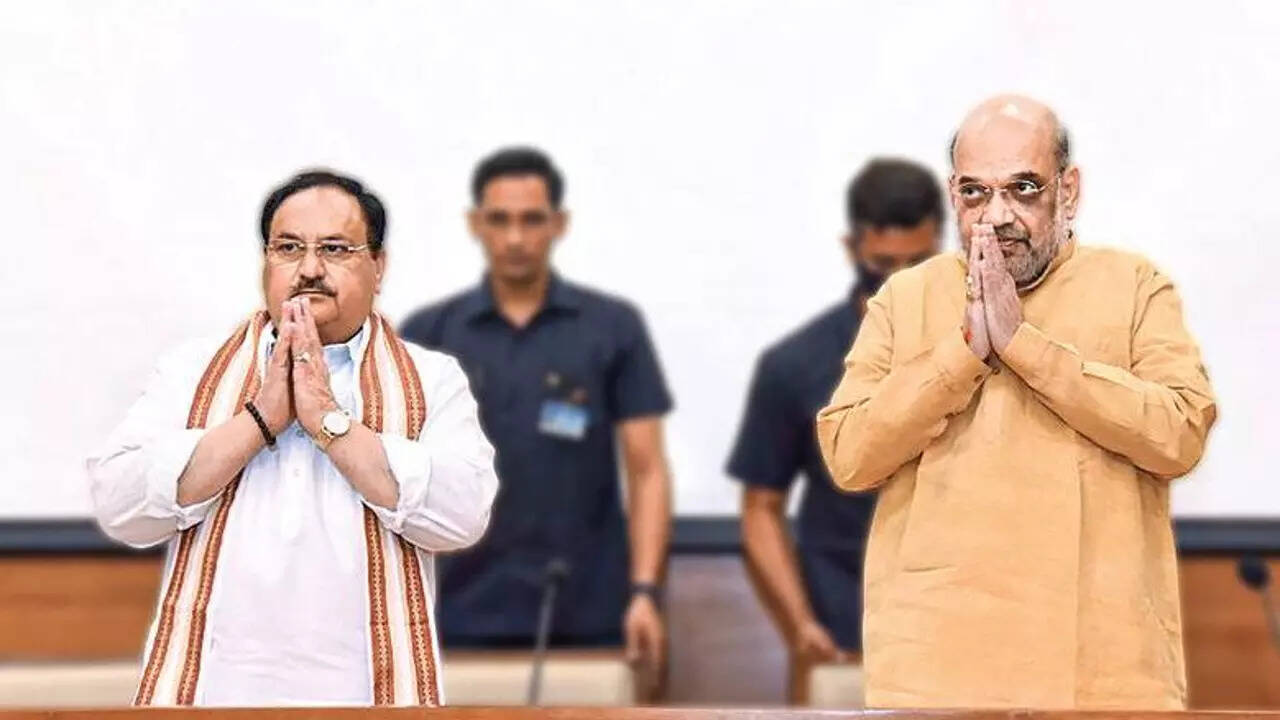
NEW DELHI: In what is seen as a determined bid to gain a solid headstart for the 2024 Lok Sabha polls, the BJP brass on Tuesday held a brainstorming session with senior ministers, who have been assigned 144 Lok Sabha constituencies, where the party had mostly lost in the 2019 general elections.
Home minister Amit Shah and BJP chief JP Nadda held an interaction with senior ministers on organisational issues. They suggested that the ministers should not ignore organisational work and keep their focus on expanding the party’s footprint by winning the LS seats where it had finished second or third on previous occasions.
“The party’s top leadership said unambiguously that the ministers also can’t ignore the organisational assignments along with their official work. They were advised that they should connect with the party workers and streamline the organisation up to the block and panchayat level,” a party source said about the deliberations which came as some in the opposition continue to wrestle with issues for putting a common front and whom to project, if at all, as their leader.
The meeting also sought to get rid of any lop-sidedness that might have crept into the ruling party, with ministers devoting special attention to the ministerial chores to the detriment of organisation's needs in the lead-up to polls—an imbalance which was diagnosed among the factors that contributed to BJP's shock loss in 2004.
The party leadership had first planned a roadmap to win a majority of the 144 Lok Sabha seats where it had mostly lost in 2019 as it had divided these constituencies in different clusters and assigned them to the senior ministers in May this year. Every minister has been given a cluster of 3-4 seats.
Party sources said Shah was unhappy over the fact that a few ministers had not visited the constituencies assigned to them and he asserted that the ministers should heed to the organisational assignments and not take them lightly. “Ministers are obviously known faces and they can play a major role in expanding the party’s footprint by reaching out to the people,” a party leader said.
“Prime Minister Narendra Modi's wide appeal cannot be utilised fully if the party lacks in organisational strength,” a source quoted Shah as having said at the closed-door meeting. Nadda asked ministers to discharge their organisational responsibilities as well, stressing that it cannot be ignored.
Over 25 Union ministers, including Bhupender Yadav, Giriraj Singh, Smriti Irani, Parshottam Rupala and Gajendra Singh Shekhawat, were among those who attended the meeting. Sources said reports were presented about the work undertaken by various ministers. The development came amid stepped-up unity efforts by BJP's rivals, including Bihar Chief Minister Nitish Kumar who met leaders of various parties in the national capital.
BJP has been working to ramp up its booth-level presence and reach out to various communities with an eye on the beneficiaries of several central government schemes, sources said. The second phase of ‘Pravas’ (tour) programme will be held between October and January.
Most of the 144 constituencies include those the party had lost in the 2019 polls, but a few winning seats are also part of the list due to difficult demographic and regional factors, sources said. BJP had won 303 seats in the 2019 Lok Sabha elections. It had identified difficult seats on similar lines in the run-up to the last polls and succeeded in winning a number of them, going past its tally of 282 seats in 2014. The party has divided the 144 seats into clusters and appointed one Union minister as their in charge. Another set of ministers was sent to assess the political situation by visiting all assembly segments within these constituencies, including in West Bengal, Telangana, Maharashtra, Punjab and Uttar Pradesh.
The ministers have done a SWOT (strengths, weaknesses, opportunities and threats) analysis for BJP in these constituencies and identified steps to ensure its victory in the 2024 elections, sources said. The party has also drawn a detailed blueprint on these constituencies that includes information on religion, caste, geography, inclination of voters, they added.







